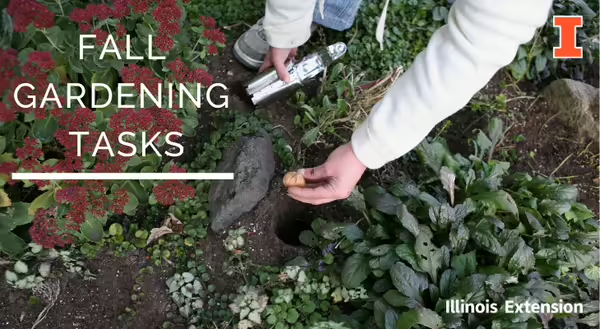
Fall is here; not only does the calendar tell us that it is officially here, but our days are getting shorter, the temperatures are cooler, combines are rolling in the fields, mums decorate front porches, and the trees are starting to turn. As our summer activities in the garden wind down, there are some things to do to prepare for cooler temperatures.
Perennials and Grasses
Seed heads can be aesthetic during the winter months and can be a feed source for birds. Foliage can also help protect and insulate crowns which can help some plants in overwintering. Standing stems also help identify plant locations of late risers in the spring. Removing and cutting back foliage is only necessary in the fall when the plants suffered from foliar diseases. Diseased plant debris should not be discarded in the compost pile as compost temperatures will not kill all pathogens. Fall is also a good time of year to consider dividing and replanting overgrown plants. When replanting, compost can be added to the hole to provide the plants with additional nutrients.
Bulbs
Tender corms, bulbs, and roots such as dahlia, gladiola, and canna lilies should be dug up and stored in a cool, dry place; this is a task that can easily be forgotten. Additionally, fall is time to plant hardy bulbs such as tulips, crocus and daffodils as these bulbs require a vernalization (cold) period to flower.
Annuals
Summer annual plantings should be removed and cleaned out. Insects and diseases can overwinter on plant residues and can potentially carryover into the next growing season if environmental conditions are favorable. This also saves time in the spring when getting ready to plant new annuals. Soil in annual beds and pots can be improved through the addition of compost or composted manure.
Pesticide Storage
Pesticides used for your lawn and garden should be safely stored at temperatures between 40 and 100F; liquid fertilizers that freeze lose effectiveness. Storing in an uninsulated garage or storage shed may not maintain these temperatures. When storing chemicals, be sure to avoid storing them near heat, sparks, or open flames. Keep chemicals in a cool, well ventilated place away from children and pets. For more information on storage, read the label.
Fall is also an ideal time to reflect on the year and determine what worked and what needs to be improved. Luckily, we get a reset each year to improve our practices and try new ideas!
Good Growing Tip: You can make your plants such as hibiscus last from year to year by bringing them indoors during the winter. Your hibiscus will require a nice, bright spot as it loves light. You should also inspect the plants for insects and clean them prior to moving them indoors.